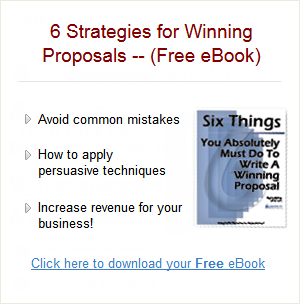What’s your impression of how the evaluation process goes? Do you imagine that the evaluator reads proposal after proposal until he happens upon the one that makes him stand up and say, “Eureka! This is it!” You know that isn’t how it goes. Yet, chances are you write your proposals as if you think that’s how
Proposals are a fact of life. To get public-sector business, you must submit proposals. In fact, most public agencies are unable to award contracts above some limit, such as $100,000, without a competitive procurement process. Therefore, it doesn’t matter how good your products are, or how many similar projects you’ve completed on time and within
Here’s a pop quiz. A proposal is: A. A technical document B. A marketing document C. A sales document D. All of the above When I ask this question in the proposal classes I teach, I get a variety of answers. The technical people sometimes select A; after all, to them the purpose of a
This one’s for you marketing professionals. As your firm’s resident “proposal specialist,” do you ever find yourself frustrated because you know what the right thing to do is but no one seems to want to hear you say it? Do you ever wish people would use your expertise more fully, would seek your professional advice
The single most important element of a winning proposal is a clear set of direct benefits the customer will receive by selecting you. Nothing is more important than that. Your proposal will win or lose on that alone. You must remember this crucial fact: From the customer’s perspective, most firms in a given competitive procurement
It’s impossible to give a description of how each evaluation process works; every firm and agency that evaluates proposals has its own way of doing it. But it is possible-and very useful-to explain a few things about proposal evaluation in general. For any given procurement, the customer receives a pile of proposals in response to
http://www.sba.gov/GC/conf/presentations/debriefing.ppt
http://www.smps.org/mrc/articles-html/presentations.htm
It is important to know how to appeal to your proposal audience in order to win their business. You need to know their “hot buttons” and include them in your proposal. To learn more about how to create audience appeal, click on the link below. http://www.smps.org/mrc/articles-html/psychologyaudienceappeal.htm
Handling the question and answer portion after presenting your proposal is a crucial step in the process. The article below contains some helpful tips for handling the Q&A session. http://www.speakoutchallenge.com/downloads/Top_10_Tips_for_Q&As.pdf

